A 3D poser maker or 3D model poser is a computer graphics program optimized for 3D modeling human figures. It’s mainly used by digital artists to easily produce animations and digital images but can also be used to edit or enhance existing third-party files.
If you think of the articulated wooden mannequins used by artists even from the time of Da Vinci, posing software is the digital version. Being in the digital age, you would expect software to provide a massive update to a basic wooden structure, and that’s certainly true of 3D posing software. There’s a multitude of posing apps and programs available, so let’s have a look at some that we’ve tried.
Considerations

3D posers are available as web applications as well as downloadable software or mobile apps. In reviewing what’s out there and deciding what makes a good 3D poser, we took the following factors into consideration:
- Easy to use: We looked at the user interface (UI) of each poser to assess whether it’s well presented and visually pleasing. We also considered ease of use and how quickly one can get to grips with the poser’s controls.
- Feature-rich: While each application we looked at had the same goal in mind, they had different functions. We considered how these features enhanced the user experience and made the application more appealing.
- Accessible: Many artists and computer users are differently-abled. Therefore, we took into consideration any adaptable settings that each application had.
- Wide compatibility: In the majority of cases, users want to produce something that can be exported to other 3D creation programs. So, it’s important to consider how compatible the program is with other software as well as across various operating systems.
- Affordable: Price is important in any field. Many of these applications offer free trials or “lite” options, which are also free. We considered these compared against the purchasable versions to see if they were worth paying extra.
So, let’s see how they stack up!
JustSketchMe

When you first open up JustSketchMe, you may dismiss its simplistic look, but appearances can be deceiving! This is a great little web app, and the UI is clear and unimposing.
The design and style of the app make it quite distinctive. The models themselves are designed to look more like traditional wooden artist mannequins. That makes it a bit quirky (in a good way!). The additional artwork is beautiful and evocative of manga.
The models have over 20 points of movement, which are easily controlled directly on the body. You get nine basic model characters to use in the free version. There’s a nice, subtle lighting control feature, the ability to change perspective, and add multiple figures and objects to your scene. One drawback is that there is no animation feature, which is worth keeping in mind.
To be fair, the basic free version is simple, but there’s enough to give you a taste of the full potential. As is the case with most of these programs, there’s the option to upgrade to Pro at an additional cost. The upgrade gives you another 30 models as well as over 200 set poses that aren’t in the free version. Another noteworthy feature is the ability to export a screenshot as a PNG, or the models in DAE and OBJ formats. And if you need help getting your bearings, you’ll find more than a handful of videos on YouTube to help you get started.
- Compatible OS: Windows, MacOS, Android, iOS, iPadOS, as well as a browser-based app
- Price: Free basic version, ~$12 monthly for Pro version, ~$100 for lifetime access
- Download: JustSketchMe, App Store
Magic Poser

The Magic Poser app is available for both iOS and Android users, and it features a very clear and easy to use UI.
The free version is rather limited, but you can get enough of what you need as a casual user. However, the paid Pro and Master versions provide a multitude of characters, objects, and scenery – giving you more scope to create some interesting scenes and animations. However, both versions, free and paid, allow you to make changes to lighting, perspective, and multiple characters.
In terms of support, there’s a simple tutorial that gets you working on a project straightaway. Since Magic Poser is an app, it’s readily available just by picking up your phone. Any accessibility issues that may not be available in the app itself are remedied by using your phone’s accessibility settings.
- Compatible OS: Android, iOS
- Price: Free basic version, ~$10 for Pro version, ~$15 for Master version
- Download: Google Play, App Store
VRoid Studio
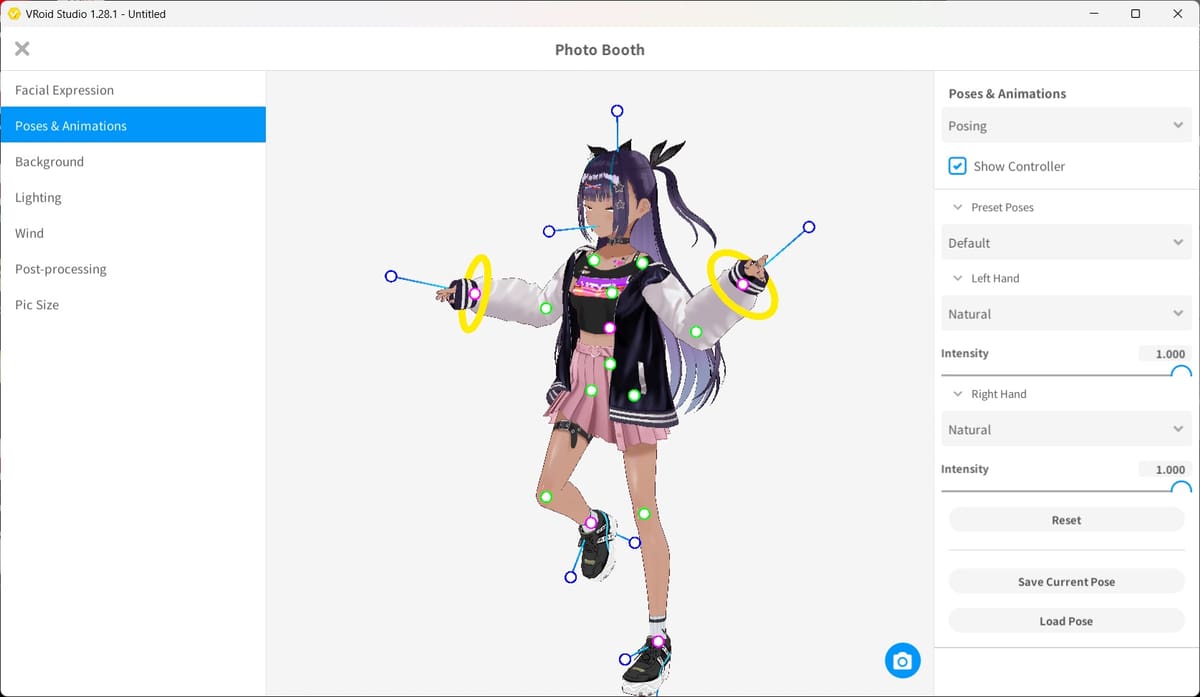
VRoid Studio is, as the developers put it, “developed for beginners with no experience in this area”. This is good to know straight off the bat because when you open the program for the first time, you can access an easy-to-follow tutorial to get started.
The UI is clear and easy to use, and you’ll soon be creating your own unique characters. The aesthetic is very anime, and there are a few preset models to work with to give you some ideas.
After you’ve created or selected a character, you can pose it with VRoid’s Photo Booth function, which can be accessed by pressing the camera icon on the top right of the UI. There are several preset poses, but the controller allows you to pose the character as you wish.
Poses can be saved in a .vroidpose file format for future use, and the characters you create can be saved as .vroid files. While this format is limited to the VRoid ecosystem, it’s possible to import the file in Blender and convert it to another file format.
It’s also worth noting that the user community around VRoid Studio is huge! User-created characters are shared on VRoid Hub, and models and other customizable features are even sold over Etsy.
- Compatible OS: Windows, MacOS, iPadOS
- Price: Free
- Download: VRoid Studio, App Store
Mixamo

Mixamo is an Adobe produced poser resource that provides you with around 150 preset characters and close to 2,500 preset animations. The characters range from simple human figures to fantasy creatures and everything in between. In terms of the animation presets, there’s basically any pose or action. In addition to individual movements, you can also look for packs (under the “Animations” tab), which include a collection of animations.
The UI is simple and clear, and it’s easy to choose the characters and select animations for them. You can even upload your own characters. If not already rigged, the custom character can be rigged as part of the upload process.
The only thing with Mixamo is that you can’t manually pose the characters; you’re locked into the preset animations. Fortunely, there are a vast amount of animations, and you can download them as either FBX or DAE files, then further customize them in your preferred 3D creation suite.
The good news, though, is that the full version is entirely free, so there’s no fear of missing out on features behind a paywall.
- Compatible OS: N/A, browser-based
- Price: Free
- Download: N/A
Manikin

Manikin is a 3D poser whose models are also in the style of the wooden artist mannequins. The UI is straightforward, and manipulating the figure is easy, smooth, and seamless – quite good fun if you just want to have a play around!
You can add multiple figures to the scene and manipulate each one independently. Another nice little feature is the inclusion of some preset animations, which are again seamless. Lighting, perspective, and scale can all be manipulated.
The software features the ability to import your own backgrounds, but there seems to be a glitch in the app when we attempted to use it. This needs to be addressed if you want to use the app fully.
The basic version is good, but it only gives you three simple mannequins and a couple of blocks as objects. Again, you’ll need to make an upgrade purchase to unlock the full feature set. These include additional props such as furniture, weapons, tool shapes, and two vehicles.
- Compatible OS: Windows, MacOS, Android, iOS, iPadOS
- Price: Free basic version, ~$10 for desktop apps
- Download: Manikin, Google Play, App Store
Daz Studio
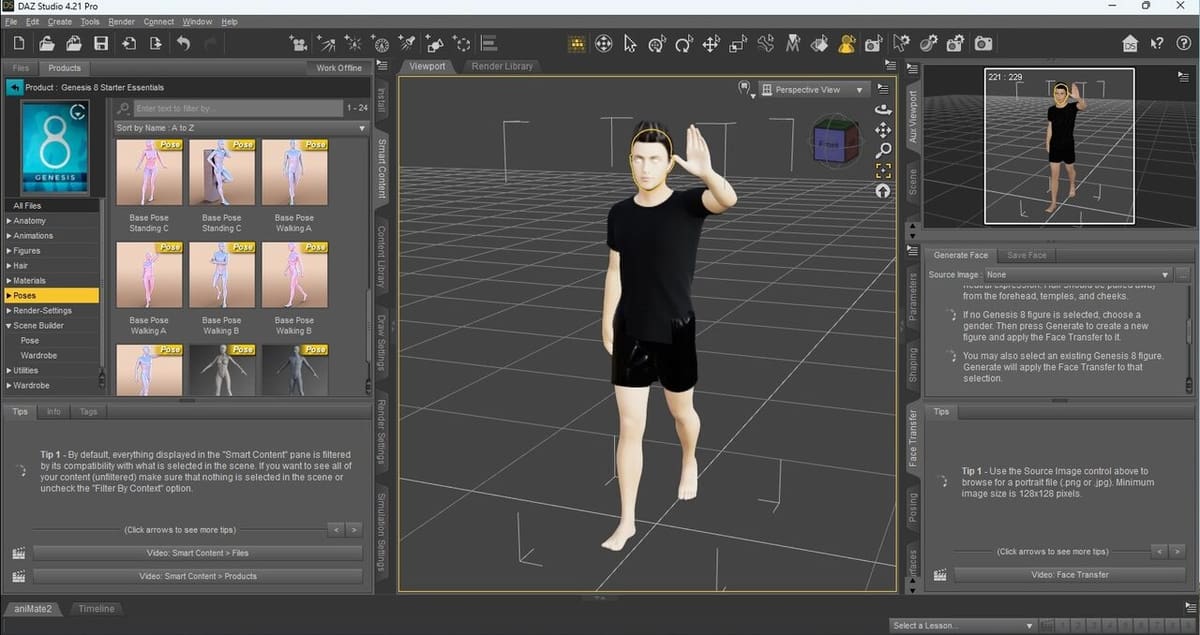
Daz Studio is a free downloadable poser program, which at first look is very user friendly. The download process is a bit involved and time consuming, but once you get to the UI, you’re presented with a menu offering you various tutorials, user guides, and training videos. It’s a good idea to go through these before you start so you get a good feel of the software, but it’s not essential.
Unlike some of the other poser software we’ve looked at, the viewport is fairly small, and centered on the screen between two other menus with tips and routes to the features. This doesn’t mean, though, that it’s any less useful. There are a few preset poses and figures in the free version – certainly enough to get you started.
The posing tool can be found in the tools menu as “Active Pose”, and this is where you can freely manipulate either one of the preset figures or add a starting pose and move your figure around from there. The movement is smooth and easy to control.
Once you’re done, you can export your file in a variety of formats supported by other design or slicer programs. Daz Studio also offers bridges to several design programs, including Blender, Maya, 3ds Max, Cinema 4D, and Unreal.
Pose Maker Pro
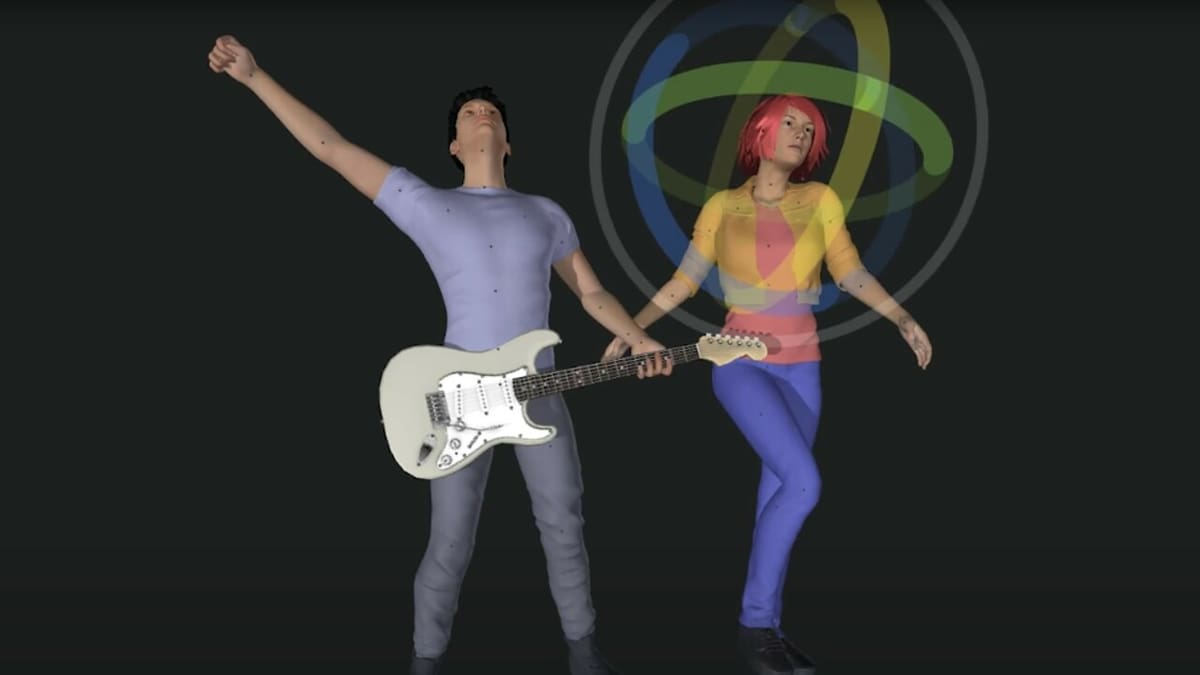
Pose Maker Pro is another iOS and Android app and, as such, it’s easy to get ahold of. When you first open the app, you are taken straight to the UI, which is a bit uninspiring to look at, but it does get you creating straightaway.
There are two character models available to use and a limited amount of hair and clothing. Extra options, as always, can be unlocked by upgrading to the Pro version, which is generally cheaper than comparable software.
The appearance of the app is geared toward manga-style figures, so if this isn’t your thing, it might not be the app for you. You can, however, bring a fair amount of realism to the models you create, which brings more life to the characters you are manipulating.
There is no tutorial included in the app, so you have to work it out for yourself to start with. There are, however, a few instructional videos available on YouTube.
- Compatible OS: Android, iOS, iPadOS
- Price: Free, ~$5 for the Pro upgrade
- Download: Google Play, App Store
Poser 13
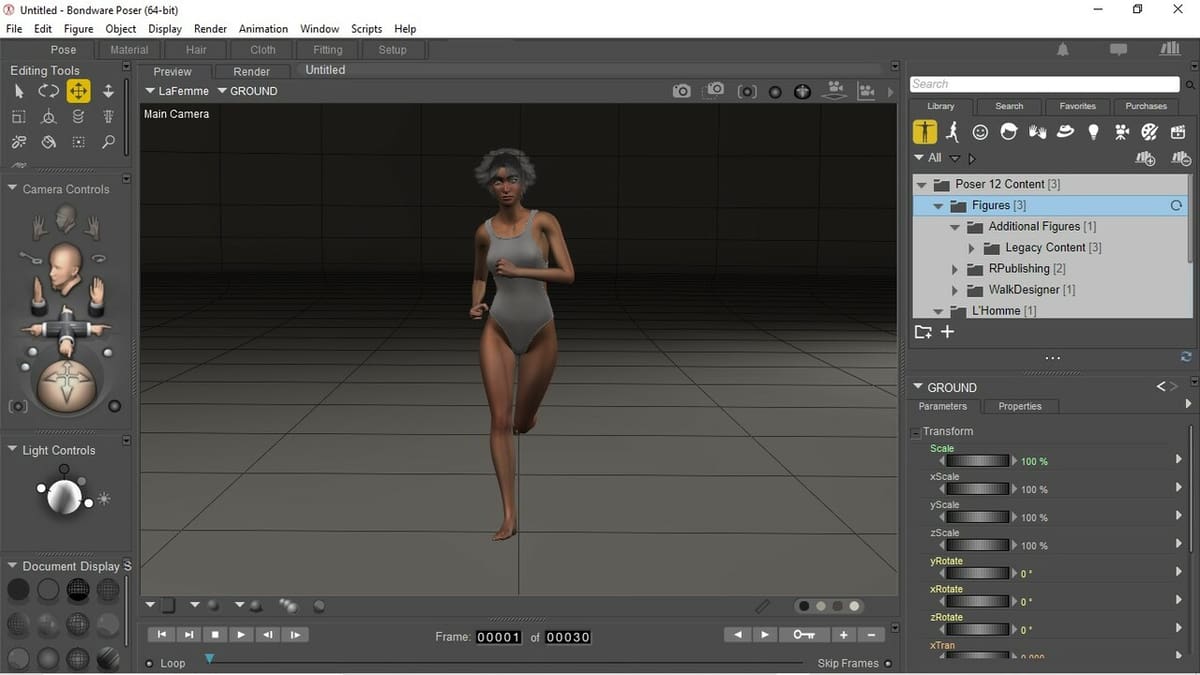
Poser 13 is a desktop program that looks and feels fantastic when you first look at it. The UI is superb, but it does take a bit of getting used to. Once you do, though, you should be able to turn out some quality work. A lot of consideration has been taken to make this a professional program. This can make it seem daunting compared with similar programs, though.
The package itself is impressive in the wealth of content it offers. The figure manipulation is easy to get to grips with, and there are multiple points of movement available. There are also multiple camera views and lighting options, which make for a more immersive 3D experience. The ability to produce short animations frame by frame is also great.
The realism of each character is richly detailed, and the add-on packages bring more options into play in this regard. To be honest, there aren’t many different figures to choose from to start with (about 20), but there are many more that can be purchased as packages or downloaded directly.
You initially get a free 21-day trial of the full program, after which you’ll have to buy a fairly expensive license to continue. Add-on packages are also available at extra cost. This makes it more suitable for the serious user, and consideration needs to be taken before buying.
- Compatible OS: Windows, MacOS
- Price: 21-day free trial, ~$250 for the full version, ~$10-$150 for add-on bundles
- Download: Poser 13
PoseMy.Art

PoseMy.Art is another nice addition to the list of web apps. The UI is simple but clear and allows for easy control and manipulation of the mannequin. Movement is smooth and controlled on the actual figure.
The basic version is just that, but it does have about 60 preset scenes and 12 basic figures. A nice aspect is that you can view the presets prior to adding them to your scene. There’s enough here to get a good start.
Upgrading to the Pro version adds over 2,400 more scenes, poses, and figures as well as the ability to save projects (a bit disappointing that this isn’t in the free version). The additional cost is not excessive, but it’s a monthly subscription. If you’re going to use it regularly, the monthly cost is probably worth paying.
- Compatible OS: N/A, as it’s only a browser-based app
- Price: Free basic version, Pro upgrade starting at ~$15 monthly
- Download: N/A
Design Doll

Design Doll is a desktop program that initially comes as a free trial. The trial version is nice to use, and the UI is simple to operate. Each control is clearly labeled and explained.
The “doll” itself is quite stylized and not an accurate anatomical model. That’s okay if it’s the movement and body position you’re after, but it won’t work if you’re looking for realism. However, the ability to manipulate the head-to-body size ratio is available, which does lend itself to a bit more realism.
For full functionality, you’ll need to buy a license. This opens up a whole range of features, including the ability to change perspective, shade, and lighting; add additional models to the scene; manipulate figures easily; as well as add paint and color effects. There’s also a nice feature that allows you to synthesize growth differences between two models to effectively age your characters.
- Compatible OS: Windows
- Price: Free version, ~$80 for the Pro license
- Download: Design Doll
MakeHuman
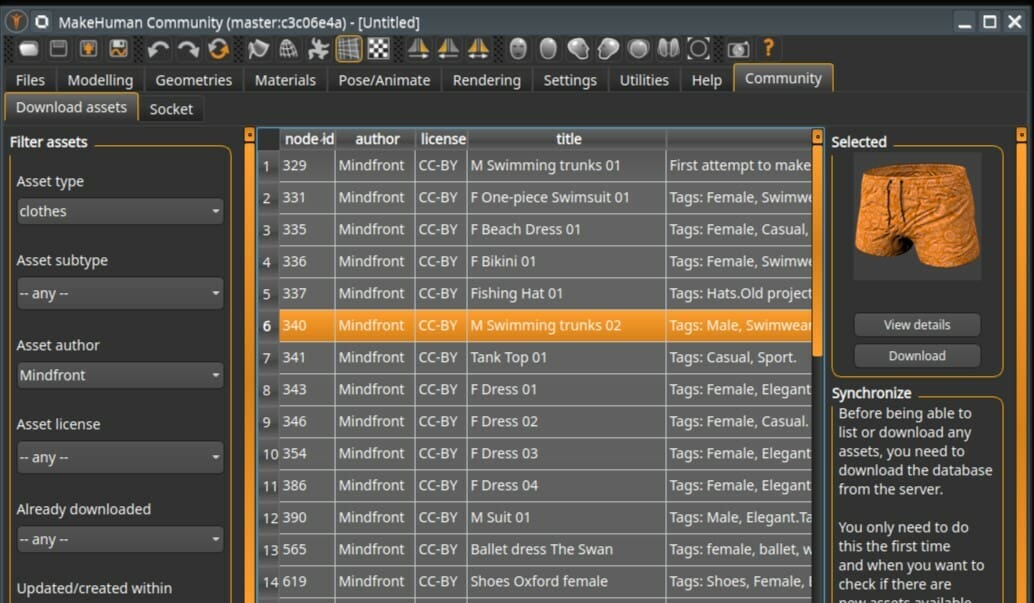
MakeHuman is a desktop program that’s entirely free to use. This makes for a refreshing change but also means there are some flaws. Glitches can occur sporadically, which can be a bit frustrating.
With that said, the UI is great and allows for a range of models with different genders, body shapes, and ethnicities. There’s a slider system to change gender, height, and build, among other characteristics.
Actions, including posing and manipulating the model, as well as creating scenes and animation, are controlled from the toolbar rather than on the model itself. This isn’t a problem, but it can feel a little less “hands-on”. Fortunately, it’s visually pleasing and easy to navigate.
Other features include the ability to add your own backgrounds, and there is a whole list of different plug-ins to enhance the productivity of the application. Accessibility is a key factor, as the UI naturally adapts to users’ desktop settings.
- Compatible OS: Windows, MacOS, Linux
- Price: Free – can’t argue with that price!
- Download: MakeHuman Community
Honorable Mentions

There are also poser maker programs that aren’t specifically meant for modeling or animating, but rather for drawing. These two options don’t really allow for animation or exporting the designs, but they present a variety of poses and characters (depending on the selected plan) that are meant to be used as references for drawing.
SetPose
SetPose is a browser-based program that has a very clean and organized UI. There are 81 default options for free (plus 4 props), but if you opt for the Pro subscription (~$3/month), you have access to detailed models and all 173 poses, plus additional features like the possibility of saving the pose, taking screenshots, and dark mode. However, if you only need references to help you get started or find inspiration, the free version has plenty to offer. You can also change the model’s settings (i.e. scaling up or down different body parts), select different colors, and modify the lighting to best suit your needs.
Figurosity
Figurosity describes itself as the “ultimate figure drawing tool for artists”, and it’s easy to see why. In addition to the free plan, there are two subscription models: Artist (~$4/month) and Pro (~$8/month). There are over 10,000 poses, although you need to keep in mind that when you select a specific model, the number of options will decrease according to what’s available for that particular one. A standout feature for those looking to develop their quick sketching skills is the timed poses. Under the “Pose Generator” tab, you can select 15-, 30-, or 45-second, 1-, 2-, or 5-minute durations, and YouTuber How to Draw Comics . NET has a great tutorial to guide you.
License: The text of "The Best 3D Poser Makers (3 Are Online)" by All3DP is licensed under a Creative Commons Attribution 4.0 International License.
